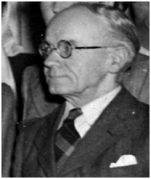The Capel Street Librarian and the 1916 Rising
Published on 7th June 2016
 A native of Dublin’s inner city, 'Tommy' Gay was educated at Synge Street CBS. His early life coincided with the political and cultural revival of the late nineteenth century and he became very active in a range of sporting and cultural organisations, including the GAA and the Gaelic League. A keen sportsman, he was a member of the Croke Gaelic Club where he became an accomplished hurler and was also a founder member of the Dublin Camogie Club.
A native of Dublin’s inner city, 'Tommy' Gay was educated at Synge Street CBS. His early life coincided with the political and cultural revival of the late nineteenth century and he became very active in a range of sporting and cultural organisations, including the GAA and the Gaelic League. A keen sportsman, he was a member of the Croke Gaelic Club where he became an accomplished hurler and was also a founder member of the Dublin Camogie Club.
Right: Thomas E. Gay (1884-1953)
As Gay himself later explained it, these organisations ‘gave impetus and new life to the revolutionary movement’. He started in the Corporation libraries as a library assistant at the then newly-opened Charleville Mall Library in line with the practice of recruiting 16 year old boys. By April 1916 he was already a mature 32-year-old man, established in his career as Capel Street Head Librarian and engaged to be married.
In September 1914, he enlisted at ‘A’ Company of the 1st Battalion of the Dublin Brigade at the Columcille Hall in Blackhall Street, Stoneybatter. From that time he drilled regularly with his company and attended field manoeuvres near Swords under commanders such as Thomas MacDonagh and Piaras Béaslaí. By early 1916 Gay had learned from his company First Lieutenant, Denis O’Callaghan that ‘a Rising was to take place early in the year.’ Under orders to parade in full kit on Easter Sunday, Gay, by his own account, turned out as instructed, but on learning of MacNeill’s countermanding order he then returned home. Gay spent Easter bank holiday Monday 24 April at the Fairyhouse races (where rumours of the fighting in Dublin reached him). Returning late on Monday night he had no way of knowing where his company was garrisoned.
A pragmatic man, by Tuesday morning he decided to report to the post nearest to his home. This was at Jameson's Distillery in Marrowbone Lane under Captain Con Colbert, who, because he had enough men inside the Garrison, decided that Gay, because of his keen knowledge of the area, should be deployed instead in an intelligence and communications role between the Jameson's Distillery Garrison and Jacob’s Biscuit Factory.
To all appearances Gay was ‘a mild mannered and innocuous bookworm’, and had a particular ability to make himself unobtrusive and so avoid suspicion. This was therefore a role to which he was well suited and, as he later recalled, ‘to which he was to become more and more attached’ (his subsequent service up to 1924 was almost exclusively in an intelligence capacity).
He went on to provide vital assistance from the Tuesday right up until the surrender on the following Sunday. Reporting in daily, he brought in crucial supplies of arms, ammunition, medical and other supplies, updating Colbert regularly on enemy movements. By the Thursday he observed the advance of a troop of the Nottinghamshire and Derbyshire regiment (the Sherwood Foresters) coming along the South Circular Road from the Harcourt Street direction, heading towards Rialto. This was most likely the advance of the 2nd Battalion, 18th Regiment of the 2/8th Sherwood Foresters who were ‘detailed to escort a consignment of ammunition to the Royal Hospital in Kilmainham’. Gay immediately forewarned Colbert who was able to alert neighbouring garrisons and frustrate the British offensive.
Colbert had instructed him to organise the urgent movement of food supplies from Jacob's factory; Gay went there on the morning of Sunday 30 April, when Thomas MacDonagh was already discussing terms of surrender. Major John MacBride, who was second in command to MacDonagh, instructed him to communicate the verbal surrender back to the Distillery where Captain Séamus Murphy was standing in for Colbert. Murphy ordered Gay back to Jacob’s to request the order in writing. MacBride refused vehemently, stating that he had never and would never put in writing an order for an Irishman to surrender and that they would know when they saw the flag coming down from their building that the surrender had taken place.
Gay avoided capture in the aftermath of the surrender. He subsequently became an Intelligence Officer on the General Headquarters staff of the Irish Volunteers, reporting directly to Michael Collins. Interrupting his library career for a time, in 1922 Gay joined the National Army, rising by 1923 to the rank of Colonel, again in an intelligence role. His place of work, Capel Street library became a centre for IRA intelligence, and his home at Haddon Road, Clontarf was frequently used by Collins for meetings.
About our Guest Blogger
Evelyn Conway is Librarian at Dublin City Public Libraries and Archive.
The above is based on an essay in the book 'Dublin City Council and the 1916 Rising', published by Dublin City Council, March 2016. Evelyn is one of a number of contributors of essays exploring events of the Rising and biographies of persons involved and either employed by the Council at the time, or subsequently.